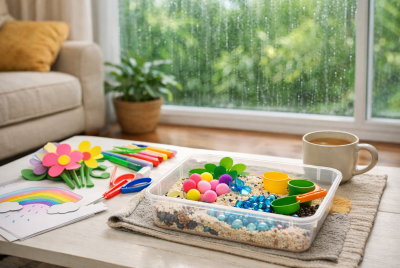Gentle Parenting Bust: Why This Trend Doesn’t Always Work
We may earn a commission for purchases made using our links. Please see our disclosure to learn more.
Over the last few years, “gentle parenting” has become a buzzword on social media, blogs, and playgrounds. The promise? Raise kind, emotionally healthy kids without yelling or punishments. But as many parents are discovering, the gentle parenting bust is real—and not every family finds lasting success with this approach. Let’s explore why gentle parenting sometimes falls flat, and what you can do when it does.
Understanding Gentle Parenting
At its core, gentle parenting focuses on treating children with respect, empathy, and compassion. This approach aims to create a close, trusting relationship with your child by keeping communication open and steering clear of harsh discipline. Rather than relying on punishments or rewards, gentle parents lead by example and acknowledge their child’s emotions, guiding behavior through understanding.
It sounds wonderful on paper. Who wouldn’t want to be calm, loving, and endlessly patient? Yet in the real world, things rarely go as smoothly as the parenting influencers suggest.
Where Gentle Parenting Falls Short
When Boundaries Blur
One of the biggest pitfalls? Confusing “gentle” with “permissive.” Children need clear boundaries. Without them, kids can become anxious or act out because they don’t know what’s expected. If parents are too focused on avoiding conflict, they might hesitate to say “no”—and chaos follows.
Real-Life Challenges Parents Face
Modern life is stressful. Work deadlines, chores, and daily hassles can drain even the most devoted parent’s patience. Gentle parenting requires emotional regulation, but let’s face it: sometimes, kids test limits at the worst moments. If you’re running on empty, staying calm is easier said than done.

The Science Behind Parenting Approaches
Research shows that children need both warmth and structure. Studies suggest that kids raised with consistent boundaries and emotional support tend to thrive. Pure gentle parenting sometimes misses the mark on firmness. When structure is lacking, behavioral issues can escalate.
Dr. Diana Baumrind’s classic research on parenting styles found that authoritative parents—who blend warmth with limits—raise the most well-adjusted kids. Gentle parenting aims for this, but when boundaries disappear, problems start to creep in.
Signs Gentle Parenting Isn’t Working
How do you know if you’re experiencing a gentle parenting bust? Here are a few red flags:
- Constant power struggles: Your child ignores requests or negotiates every rule.
- Increasing misbehavior: Instead of improving, behavior seems to get worse.
- Parental burnout: You feel exhausted, resentful, or guilty.
- Kids lack resilience: Children seem overly sensitive or have trouble handling “no.”
If this resonates with you, know that you’re not the only one. Many loving, attentive parents struggle to find balance.
What Does the Research Really Say? Science Behind Gentle Parenting
If you’re questioning whether the gentle parenting bust is just anecdotal—or actually rooted in research—look no further. Scientists have dug into what makes some parenting styles succeed while others flop. Here are two key studies that shed light on the strengths and pitfalls of gentle parenting approaches:
1. Authoritative Parenting Yields the Best Results
A comprehensive longitudinal study on authoritative parenting and academic achievement followed adolescents over time to see how different parenting styles affected their success. The results? Kids raised with a blend of warmth and firm boundaries (the hallmark of authoritative parenting) performed significantly better in school and developed stronger self-belief compared to those with permissive or authoritarian parents. This backs up the idea that gentle parenting—when it loses structure—can fall short, while consistent boundaries combined with empathy help children thrive.
2. Parental Sensitivity Strengthens Attachment
Another essential resource is the meta-analysis on parental sensitivity and infant attachment. This large-scale review of more than 80 studies found that when parents respond to their children’s emotional needs with sensitivity, kids are much more likely to develop secure, healthy attachments. These secure bonds are the building blocks for confidence, social skills, and emotional regulation. However, the research also stresses that sensitivity alone isn’t enough—children also benefit from clear expectations and guidance.
These studies reinforce that while empathy and understanding are critical, gentle parenting works best when paired with clear boundaries and consistency. For more in-depth reading, explore the full research articles linked above—they offer practical insights for parents navigating real-world challenges.
What to Do When Gentle Parenting Busts
Blending Strategies for Balance
You don’t have to give up on kindness or empathy. The key is to blend gentle principles with clear expectations. Speak clearly and follow through on your words. Follow through with gentle but firm consequences.
For example, calmly state, “We don’t hit. If you hit, you will need a break to calm down.” Then, stick to it. Your child learns that kindness and limits go hand in hand.
Setting Clear Limits With Kindness
Children feel safest when they know where the boundaries are. That doesn’t mean yelling or punishments. It means explaining your expectations and holding firm. Show empathy, but don’t back down. When you set limits with warmth, kids develop respect—for you and for themselves.
If you want more actionable strategies for dealing with stubborn or challenging behavior, take a look at this practical guide on how to parent a defiant child. You’ll find step-by-step advice to reinforce gentle parenting with real-world boundaries.
Real Parent Stories: Learning the Hard Way
Take Sarah, mom of two, who embraced gentle parenting with open arms. At first, things went well. But soon, bedtime turned into hours of negotiation. Her son pushed every limit, and Sarah felt powerless. After some soul-searching, she started setting clearer boundaries. The result? Less arguing, happier kids, and a calmer home.
Or meet James, a single dad. He tried gentle parenting but found his daughter walked all over him. When he started blending structure with empathy, things improved overnight.
These stories are common. Sometimes, a gentle parenting bust is the wake-up call you need to adapt.

Top Recommended Parenting Tools & Products
Want real-world solutions for balancing gentle parenting with structure? Here are top-rated products and resources to make family life smoother and more connected:
- Melissa & Doug Magnetic Responsibility Chart: A hands-on, visual tool for setting expectations and rewarding positive behaviors—perfect for gentle but clear daily structure.
- Time Timer MOD Visual Timer: Helps children understand time limits for activities or transitions without arguments, making routines easier for everyone.
- Calm Down Corner Kit: A ready-to-use set with emotion cards and sensory tools for teaching self-regulation and supporting gentle discipline.
- Learning Resources Time Tracker Visual Timer & Clock: This colorful timer offers visual and audio cues to help kids manage time for chores, homework, or transitions without power struggles.
- Anger Management Skill Cards for Kids: A deck of cards with prompts and exercises designed to help kids manage big emotions in a gentle, constructive way.
Conclusion: Find What Works For Your Family
Gentle parenting isn’t a failure—unless you think it’s the only answer. The truth is, parenting is messy, and no one method works for every child or family. If you’re hitting the gentle parenting bust, take a breath. Try blending empathy with structure, and don’t be afraid to change course. Your family’s well-being comes first. Trust yourself, and keep learning—your kids will thank you for it.
FAQs
1. What is gentle parenting in simple terms?
Gentle parenting is an approach focused on empathy, respect, and understanding, avoiding harsh discipline in favor of guidance and emotional connection.
2. How do I know if gentle parenting isn’t working?
Watch for frequent power struggles, growing misbehavior, and parental burnout. If your child ignores limits or behavior worsens, it might be time to adjust.
3. Can you switch from gentle parenting to another style?
Absolutely. Parenting isn’t all-or-nothing. You can blend gentle techniques with clearer boundaries at any time—children are adaptable!
4. Is gentle parenting effective for all children?
Not always. Every child is unique. Some kids need more structure, while others thrive on connection. The best approach adapts to your family’s needs.
5. What are the best resources for parents who are struggling?
Tools like visual charts, calm-down kits, and online parenting courses can help. Support groups, online forums, and parenting coaches are also valuable.




